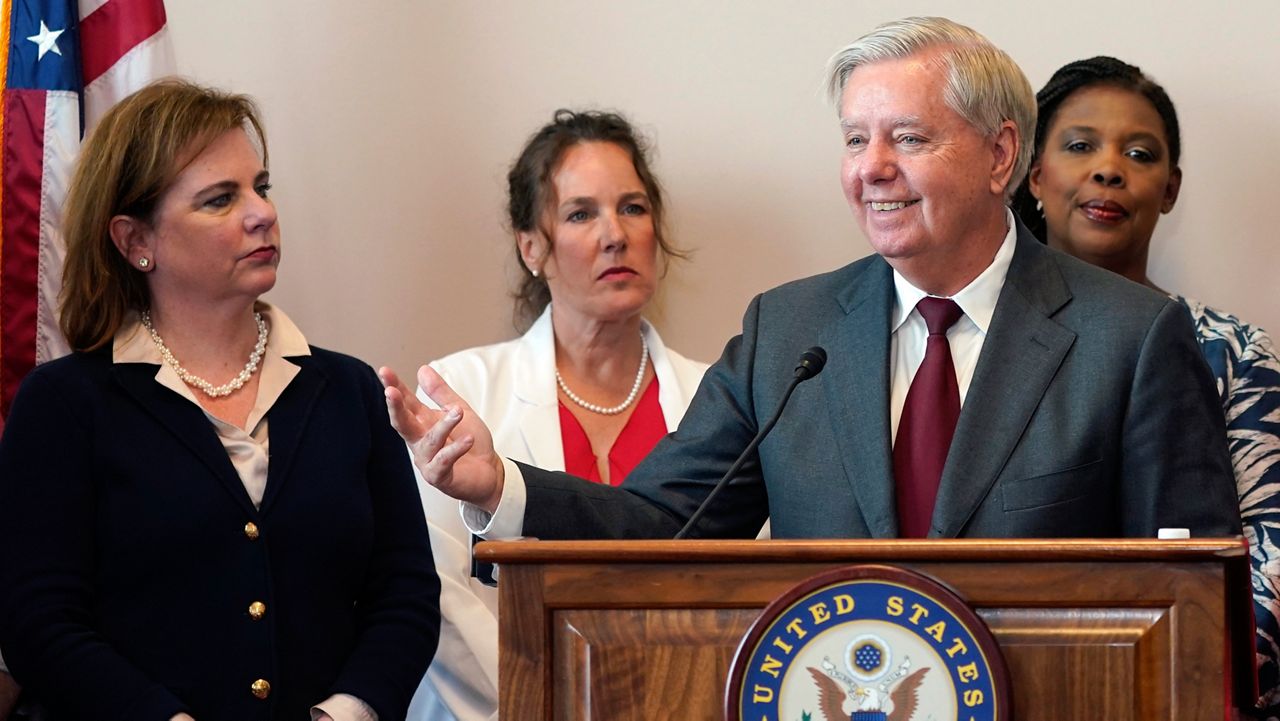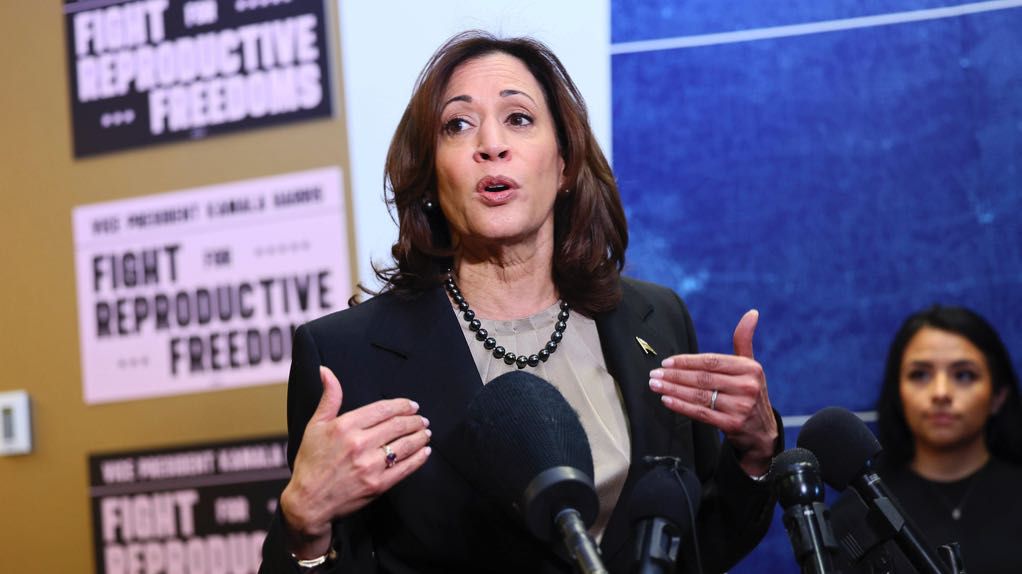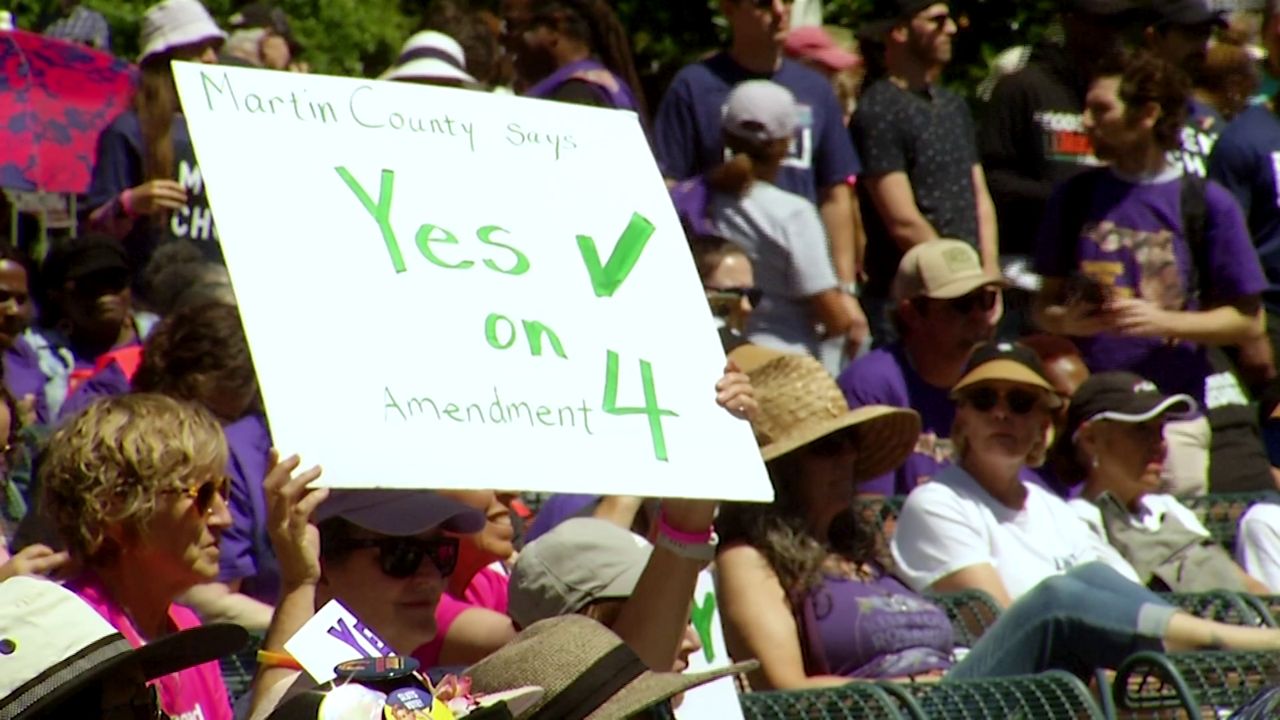South Carolina Sen. Lindsey Graham’s fellow Republicans appeared to be largely surprised by his announcement Tuesday of a federal 15-week abortion ban, with many members of his party distancing themselves from the proposal.
At a press conference Tuesday, Graham — flanked by anti-abortion activists — announced the bill, which would ban abortions nationwide after 15 weeks of pregnancy, save for cases of rape, incest or if the mother’s life is at risk.
Graham said that his bill would “put the United States abortion policy in line with other developed nations such as France, Germany, Belgium, Denmark, Spain and other European nations.”
"Abortion is not banned in America,” he said. “It’s left up to elected officials to define the issue. You have states and the ability to do it at the state level, and we have the ability in Washington to speak on this issue if we choose. I have chosen to speak.”
Graham has previously said that, in the aftermath of the Supreme Court overturning Roe v. Wade, the issue of abortion should be left up to the states.
The South Carolina Republican wrote on Twitter in May that “if the Supreme Court overturns Roe v. Wade … it means that every state will decide if abortion is legal and on what terms.” He also told CNN in June that “I think states should decide the issue of marriage and states should decide the issue of abortion.”
But when asked Tuesday about his change in position, Graham said that he wanted to stipulate his party’s stance on abortion: “After [Democrats] introduced a bill [efforts to codify Roe v. Wade into law] to define who they are, I thought it would be nice to introduce a bill to define who we are.”
The bill has no chance of making it into law with Democrats in control of the Senate and the White House.
A top policy adviser for the White House on abortion rights told Spectrum News Wednesday that Graham's effort was "wildly out of step with what Americans believe," referring to polling that shows Americans largely support abortion rights.
"Senator Graham is going in the opposite direction to say, in fact, there should be abortion bans, a national abortion ban, across the country," said Jen Klein, co-chair of the White House Gender Policy Council.
"It's actually blatantly hypocritical, because these are the same people who said abortion rights should be decided by the states, at the state level," she added. "You can see he's really out there alone at the moment, because the Republicans have been quite clear that this should be a state-level decision.
"They've also been quite clear that, if given the chance, they would absolutely pass a national ban."
Klein added that while Graham's bill isn't a total "ban," she sees it as a clear a step toward restrictions even earlier than 15 weeks.
"I think their intentions are clear. What they want is the ban on abortion services across this country," she said. "So we're calling it what it is, which is prohibiting people from getting a service, a medical service, and from exercising their right to make decisions about their own bodies."
Graham pledged that “if [Republicans] take back the House and the Senate, I can assure you we’ll have a vote on our bill.”
But even if Republicans were to retake the chamber, it doesn't appear that there’s much enthusiasm to pass such legislation. There are at least two Republicans, Sens. Lisa Murkowski of Alaksa and Susan Collins of Maine, who support abortion rights.
In response to a question about whether or not such a bill would come to the floor if Republicans take the Senate, Republican leader Mitch McConnell, R-Ky., directed inquires to Graham.
"I think every Republican senator running this year in these contested races has an answer as to how they feel about the issue," McConnell said, adding: "I leave it up to our candidates who are quite capable of handling this issue to determine for them what their response is."
But, McConnell said, “I think most of the members of my conference prefer that this be dealt with at the state level.”
Members of McConnell's caucus appeared inclined to agree with his assessment.
“I don’t think there’s an appetite for a national platform here,” West Virginia Sen. Shelley Moore Capito told POLITICO, noting that her home state was working on abortion restrictions, which passed later Tuesday.
“I’m not sure what he’s thinking here,” she added. “But I don’t think there will be a rallying around that concept. I don’t think there’s much of an appetite to go that direction.”
Texas Sen. John Cornyn said that Graham’s actions were his own, telling POLITICO: “That wasn’t a conference decision. It was an individual senator’s decision.” (Graham indicated to reporters Tuesday that he had not spoken to Leader McConnell about his proposal.)
Cornyn noted that “there’s obviously a split of opinion” about whether abortion should be left up to the states or if the federal government should set a “minimum standard,” but noted that “my preference would be for those decisions to be made on a state-by-state basis.”
Wisconsin Sen. Ron Johnson, who is up for re-election in November, told ABC News that “at this point in time, nothing is going to pass Congress” and stressed that the issue of abortion has “got to be decided in the states.”
“I think that is the appropriate place for this to be decided,” Johnson told the outlet.
North Carolina Sen. Thom Tillis demurred, telling reporters on Tuesday that he wants “to focus on the inflation numbers that came out today, the imminent potential strike with railway workers.”
Tillis, who supported a previous proposal from Graham banning abortions at 20 weeks, said he would prefer to focus on "other things that I think are going to have a consequence in the election."
A spokesperson for Tillis told Spectrum News that he "believes we need to focus on combatting inflation," adding: "Senator Graham’s bill has no chance of passing the current Congress so the decision will continue to be left to individual states."
The bill is not without Republican support, however. A House version of the bill was co-sponsored by more than 80 Republicans, including Rep. Ted Budd, R-N.C., who is running for U.S. Senate in North Carolina against Democrat Cheri Beasley.
A spokesperson for Budd told Spectrum News that the congressman has "always been transparent that Ted is pro-life and he has previously supported similar pain-capable legislation."
It was also co-sponsored in the Senate by Montana Sen. Steve Daines and Florida Sen. Marco Rubio, the latter of whom is up for re-election in November.
And in a statement to POLITICO, Herschel Walker, the Republican nominee for U.S. Senate in Georgia, said he would back the bill: "I am a proud pro-life Christian, and I will always stand up for our unborn children. I believe the issue should be decided at the state level, but I WOULD support this policy."
But another Republican Senate candidate, Colorado's John O'Dea, called the proposal "reckless and tone deaf" and offered praise for the group of bipartisan lawmakers trying to codify abortion rights protections.
“Senators [Tim] Kaine, [Kyrsten] Sinema, [Susan] Collins, and [Lisa] Murkowski are providing leadership on behalf of the overwhelming majority of Americans,” O’Dea, who supports some abortion rights, said in a statement. “We need more bipartisan dialogue, and less partisan peacocking from both sides.”
“America wants balance on the abortion issue, not a forever cold war between the far left and the far right,” he wrote. “Congress should pass a bill protecting a woman’s right to choose early in pregnancy, whether a woman lives in Mississippi or Massachusetts, and there should be sensible limits on non-medically necessary late term abortion and parental notification for minors. I don’t support Senator Graham’s bill.”
While Republicans attempted to distance themselves from Graham's announcement, Democrats hammered the GOP on it, including the White House calling the proposal "wildly out of step with what Americans believe."
"Republicans in Congress are focused on taking rights away from millions of women," White House press secretary Karine Jean-Pierre said in a statement Tuesday following Graham's press conference. "The President and Vice President are fighting for progress, while Republicans are fighting to take us back."
At her weekly press conference on Wednesday, House Speaker Nancy Pelosi, D-Calif., addressed what she called "a conflict within the Republican Party" on abortion.
"You have to ask the Republicans as to why they pour cold water on it, but they know they are digging a hole and they just keep digging," the California Democrat said, adding: "Women are not happy about this, and they're making their views known. It's so unfortunate."
"I respect everybody's do about how they decide to do what they do, and we should continue to respect their freedom to do so," she continued. "But I think what you're seeing there is a conflict within the Republican Party."
"There are those in the party but think life begins at the candlelight dinner the night before," Pelosi added. "And these people are in defiance of that, right? They're in defiance of that, because they're saying whatever they're saying ... but we are united in our support for women's right to choose."
On the Senate floor on Tuesday, Senate Majority Leader Chuck Schumer, D-N.Y., railed against the measure, calling it a "radical bill to institute a nationwide restriction on abortions."
"For the hard right, this has never been about states’ rights," the New York Democrat charged. "This has always been about making abortion illegal."
A number of Democrats who are on the ballot in the fall weighed in about the ban, pledging to fight for a woman's right to choose should voters pick them.
Washington Sen. Patty Murray, a staunch defender of abortion rights, said Republicans “want to force” women to stay pregnant and deliver babies.
“To anyone who thought they were safe, here is the painful reality,” said Murray, who is up for re-election in November. “Republicans are coming for your rights.”
Sen. Catherine Cortez Masto, a Nevada Democrat, wrote on Twitter that Graham “and every other anti-choice extremist can take a hike.”
Sen. Michael Bennet, who is running for re-election in Colorado against O'Dea, wrote on Twitter that, “a nationwide abortion ban is outrageous" and pledged "to defend a woman’s right to make her own health care decisions, no matter what ZIP code she lives in. We cannot afford to let the Republicans take back the Senate.”
“Congressman Budd will stop at nothing to put himself between women and doctors," Beasley said in a statement to Spectrum News. "His national abortion ban will not only take away our freedom - it will cost North Carolina women their lives and he owes an explanation to every woman whose life he has now put at risk.”
With less than two months to go until November’s midterm elections, voters have increasingly listed abortion as a top issue on their minds heading into the voting booths, leaving some Republicans backtracking on their stances on the procedure.
Coming on the heels of a surprise blowout win for abortion rights in Kansas and Democratic victories in special elections following the Supreme Court’s reversal Roe v. Wade, some Republican candidates have attempted to soften their tone on abortion and even remove mentions of their stance from their campaign websites.
Arizona Senate candidate Blake Masters, for instance, recently scrubbed his campaign website of some of his hard-line messages on abortion, including a statement where he described himself as “100% pro-life.” He previously called abortion “demonic” during his primary and supported a federal personhood law to give unborn fetuses the rights of people.
Masters’ references to support of "a federal personhood law … that recognizes that unborn babies are human beings that may not be killed” was also removed from his website, per NBC News.
According to a recent NPR/PBS NewsHour/Marist poll, abortion is the top issue for Democrats in November's midterm contests (35%), and the No. 2 issue overall among all voters (22%) behind infllation (30%). The survey also found that 77% of Democrats and 58% of independents are more likely to vote due to the Supreme Court overturning Roe v. Wade, compared to 42% of Republicans.
A recent poll from Pew Research Center found that 61% of Americans believe abortion should be legal in all or most cases.
Spectrum News' Reuben Jones and The Associated Press contributed to this report.








